
Euphaeidae, sometimes incorrectly named Epallagidae and commonly called gossamerwings, is a family of damselflies in the odonate superfamily Calopterygoidea. The family is small, consisting of around 78 species living species in nine genera occurring in the Palearctic, Australasia, and Asia. The family contains two subfamilies, Euphaeinae, encompassing all the living species and a single fossil genus, and the extinct Eodichromatinae, encompassing fossil genera from the Eocene to late Oligocene. Euphaeid species are large and mostly metallic-coloured, looking similar to species of damselflies in the family Calopterygidae.
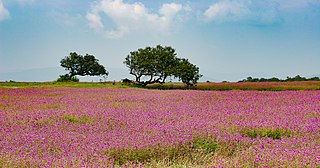
The Kas Plateau Reserved Forest, also known as the Kaas Pathar, is a plateau situated 25 kilometres west from Satara city in Maharashtra, India. It falls under the Sahyadri Sub Cluster of the Western Ghats, and it became a part of a UNESCO World Natural Heritage Site in 2012.

Vestalis apicalis, or the black-tipped forest glory, is a species of damselfly belonging to the family Calopterygidae. It is found in India and Sri Lanka.
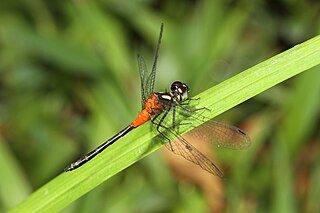
Epithemis mariae is a species of dragonfly in the family Libellulidae known commonly as the rubytailed hawklet. It is endemic to the Western Ghats, India. The species is found in small colonies closely associated with forested marshes.

Dysphaea ethela, black torrent dart, is a species of damselfly in the family Euphaeidae. The insect is named after Frederic Charles Fraser's wife, Ethel Grace Fraser (1881-1960), a constant companion of his collecting trips in India.

Euphaea cardinalis, Travancore torrent dart, is a species of damselfly in the family Euphaeidae.

Euphaea dispar, Nilgiri torrent dart, is a species of damselfly in the family Euphaeidae.

Euphaea fraseri, Malabar torrent dart, is a species of damselfly in the family Euphaeidae. This species is endemic to the Western Ghats; known to occur in various locations up to Goa.

Elattoneura souteri is a damselfly species in the family Platycnemididae. It is endemic to Western Ghats in India.

Protosticta gravelyi, pied reedtail is a damselfly species in the family Platystictidae. It is endemic to Western Ghats in India. It is very widely distributed in hill streams of Western Ghats from Goa to Agasthyamala hills in Thirunelveli district of South India.
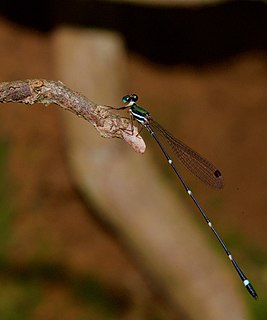
Protosticta davenporti, Anamalai reedtail, is a damselfly species in the family Platystictidae. It is endemic to Western Ghats in India.
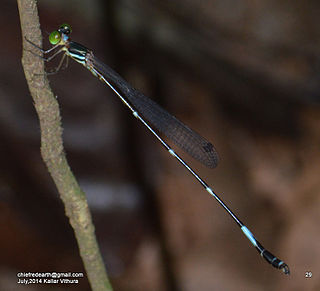
Protosticta ponmudiensis, Travancore reedtail, is a damselfly species in the family Platystictidae. It is endemic to southern Western Ghats in India. It is named after the type locality (Ponmudi), a hill station near Thiruvananthapuram, Kerala, where the species was discovered.

Protosticta rufostigma, is a damselfly species in the family Platystictidae. It is endemic to Western Ghats in India.

Lestes patricia is a species of damselfly in the family Lestidae. It is native to Western Ghats in India.
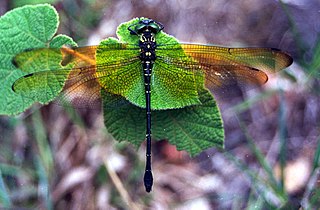
Chlorogomphus campioni, Nilgiri mountain hawk, is a species of dragonfly in the family Chlorogomphidae. It is known only from the Western Ghats of India. The distribution of the species is restricted to South Canara and Kodagu in Karnataka, Malabar in Kerala and the Nilgris in Tamil Nadu.

Chlorogomphus xanthoptera is a species of dragonfly in the family Chlorogomphidae. It is known only from the Western Ghats of India, to the south of Palakkad Gap, including Anamalai Hills, Tirunelveli Hills, Munnar and south of Travancore.
Onychogomphus malabarensis is a species of dragonfly in the family Gomphidae. It is endemic to the streams of Western Ghats of India.
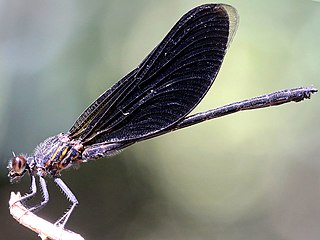
Euphaea masoni is a species of damselfly in the family Euphaeidae, the gossamerwings.

Euphaea formosa is a species of damselfly in the family Euphaeidae, found primarily in Taiwan.

Euphaea thosegharensis, Thoseghar torrent dart, is a species of damselfly in the family Euphaeidae. The species name thosegharensis is a toponym derived from the type locality in Thoseghar, Satara district, Maharashtra, India.



















